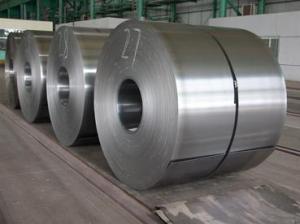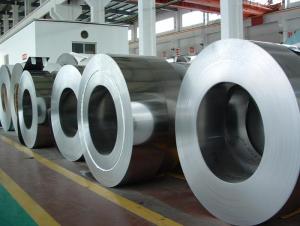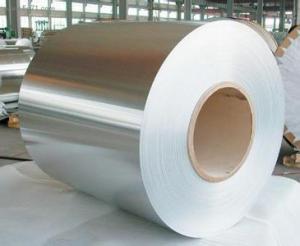Cold Rolled Steel Coils-DC03 with High Quality
- Loading Port:
- China main port
- Payment Terms:
- TT or LC
- Min Order Qty:
- 50 m.t.
- Supply Capability:
- 10000 m.t./month
OKorder Service Pledge
OKorder Financial Service
You Might Also Like
Cold Rolled Steel Coils-DC03 with High Quality
Brief Introduction
Cold Rolled Steel is steel thathas been worked below its recrystallization temperature by passing it between apair of rollers. Recrystallization temperature is the temperature at whichgrains in the lattice structure of the metal have been rearranged, leaving it freeof strain and deformations. Cold Rolled Steel is pre-treated before being coldrolled with a process known as pickling, which uses strong acids to removescale and other impurities. The Cold Rolled Steel is then passed throughrollers to reduce its thickness. Most cold rolling takes place in multiplepasses and as the size of the Cold Rolled Steel is further reduced, itsstrength and hardness both increase, but its ductility decreases. After coldrolling, heating the metal up in a process known as annealing can restore someof its ductility. The final Cold Rolled Steel may be manufactured in the formof sheets, strips, bars, or other forms.
Application
It’s widely used in outdoor andinterior decoration, furnishing manufacturing, home appliance, automobile etc.
Main Specification
COLD ROLLED STEEL | |
THICKNESS | 0.2-2MM |
WIDTH | 600-1250MM |
SHEET LENGTH | 0-6000MM |
COIL ID | 508MM OR 610MM |
SURFACE TREATMENT | MATT FINISH/BRIGHT FINISH, OILED/DRY |
ANNEALING METHODS | BRIGHT ANNEAL/BLACK ANNEAL |
COIL WEIGHT | 1-12MT |
Advantage
1. High Quality SurfaceFinish
2. High Dimensional Precision
3. Excellent mechanicalproperty
FAQ
1.How to guarantee the quality of the products?
We have established the international advanced quality management system,every link from raw material to final product we have strict quality test;We resolutely put an end to unqualified products flowing into the market. At the same time, we will provide necessary follow-up service assurance.
2. How long can we receive the product after purchase?
Usually within thirty working days after receiving buyer’s advance payment or LC. We will arrange the factory manufacturing as soon as possible. The cargo readiness usually takes 15-25 days, but the shipment will depend on the vessel situation.
- Q:How do steel coils contribute to the agricultural industry?
- Steel coils are essential in the agricultural industry as they are used to manufacture various equipment and machinery. From tractors and harvesters to irrigation systems and storage tanks, steel coils provide the necessary strength and durability required for these agricultural applications. Additionally, steel coils are used in the construction of infrastructure like barns, silos, and fences, ensuring the safe storage and protection of crops and livestock. Overall, the use of steel coils in the agricultural industry helps enhance productivity, efficiency, and sustainability in farming operations.
- Q:What are the factors that affect the quality of steel coils?
- There are several factors that can affect the quality of steel coils. Some of the key factors include the selection and quality of raw materials used, the manufacturing processes employed, the level of expertise and skill of the workforce, the adherence to strict quality control measures, and the overall condition and maintenance of the equipment used in the production process. Additionally, external factors such as environmental conditions and transportation methods can also impact the quality of steel coils.
- Q:okay i got some questions of the steel plow.1st - who inveneted it? where and when?2nd - how did it work? what is it used for? what is it made of? how is it produced?okay guys thank you very much. remember best answer gets best answer 10 points!
- If you're willing to substitute the word iron for steel (steel came a good bit later in history), the Girard plow from the 1300's in Belgium would be the first example known. It's named after the guy who invented it (Girard). How did it work? Like any other plow! You drag it along and it makes a trench of sorts in the ground! It was used for agricultural purposes. As for how it was produced, you need to look up the history of the Iron Age to understand how they started to use iron back in about 1200BC to make tools.
- Q:What are the dimensions of steel coils used in the HVAC industry?
- Different applications and system requirements in the HVAC industry can lead to varying dimensions for steel coils. However, there are commonly used standard dimensions. A typical width for steel coils in HVAC systems is approximately 24 inches or 2 feet. This width promotes efficient airflow and heat transfer within the system. The thickness of the steel coils can also vary, but it usually falls within the range of 0.020 inches to 0.060 inches. Thicker coils may be utilized for heavy-duty applications or systems demanding higher performance, while thinner coils are suitable for lighter-duty or cost-effective systems. The length of the coils can also vary based on the specific HVAC system requirements. Although coils are often manufactured in standard lengths like 50 or 100 feet, customization is possible to meet unique needs. It is essential to recognize that these dimensions serve as general guidelines and may differ depending on the manufacturer, supplier, and specific HVAC system requirements. Seeking advice from industry professionals or manufacturers can offer more precise information on the dimensions of steel coils for a particular HVAC system.
- Q:How are steel coils inspected for thickness using ultrasonic testing?
- Steel coils are inspected for thickness using ultrasonic testing by first preparing the surface of the coil and applying a couplant gel. Then, an ultrasonic transducer is placed on the surface and emits high-frequency sound waves into the coil. These sound waves travel through the material and are reflected back when encountering a change in thickness. The transducer receives these echoes and measures the time it takes for them to return. By analyzing the time delay, the thickness of the steel coil can be accurately determined.
- Q:What is the maximum temperature steel coils can withstand?
- The maximum temperature that steel coils can withstand depends on the specific type of steel and its intended application. However, generally speaking, steel coils can withstand temperatures ranging from around 500 to 1200 degrees Celsius (932 to 2192 degrees Fahrenheit).
- Q:How are steel coils priced?
- Steel coils are typically priced based on several factors including the current market demand and supply, the grade and quality of the steel, production and transportation costs, as well as any additional processing or customization requirements.
- Q:Steel is a mixture of Iron Carbon . So , is steel a metal or non - metal ?
- Steel is an alloy mostly made of metallic elements. You really wouldn't classify steel as a metal or a nonmetal. That terminology is mostly used with pure elements.
- Q:What are the challenges in coil recoiling?
- Coil recoiling, which is also known as coil winding, brings about a range of challenges that depend on the specific application and requirements. Some of the common hurdles encountered in coil recoiling are as follows: 1. Precision and accuracy: Achieving precise and accurate winding is vital for optimal coil performance. It is crucial to maintain consistent tension throughout the winding process, ensure proper alignment, and control the speed in order to prevent variations in the electrical properties of the coil. 2. Wire management: Managing the wire during the recoiling process can be difficult. The wire may be fragile, prone to tangling, or have specific handling requirements, such as being sensitive to magnetic or thermal influences. Employing proper wire management techniques, such as tension control, wire guide systems, and spooling mechanisms, is necessary to prevent wire damage and ensure uniform winding. 3. Space limitations: In many cases, coils need to fit within specific space constraints. Designing and winding coils to fit compact spaces can be challenging, particularly when considering the required number of turns, wire size, insulation, and any additional components or structures that may need to be incorporated. 4. Material selection: The selection of the appropriate wire and insulation material is crucial for optimal coil performance and durability. Factors such as electrical conductivity, thermal properties, mechanical strength, and chemical resistance must be taken into account to ensure that the coil can withstand the operating conditions and environmental factors it will encounter. 5. Heat dissipation: Coils often generate heat during operation, especially in high-power applications. Efficient heat dissipation is crucial to prevent overheating and ensure the longevity of the coil. Techniques such as designing the coil with proper ventilation, utilizing cooling mechanisms, or incorporating heat sinks are employed to address this challenge. 6. Quality control: Ensuring consistent quality in coil recoiling can be challenging due to factors such as variations in wire properties, operator skill, equipment calibration, and environmental conditions. Robust quality control measures, such as conducting regular inspections, performing electrical tests, and monitoring process parameters, need to be implemented to maintain consistent coil performance. In summary, coil recoiling demands meticulous attention, precision, and adherence to specific requirements in order to overcome the challenges and produce high-quality coils that meet the desired performance criteria.
- Q:Can steel coils be coated with self-cleaning materials?
- Yes, steel coils can be coated with self-cleaning materials. These materials, typically hydrophobic or photocatalytic coatings, can help prevent the accumulation of dirt, grime, and other contaminants on the surface of the steel coils. This not only maintains the aesthetic appeal of the coils but also reduces the need for frequent cleaning and maintenance.
1. Manufacturer Overview |
|
|---|---|
| Location | |
| Year Established | |
| Annual Output Value | |
| Main Markets | |
| Company Certifications | |
2. Manufacturer Certificates |
|
|---|---|
| a) Certification Name | |
| Range | |
| Reference | |
| Validity Period | |
3. Manufacturer Capability |
|
|---|---|
| a)Trade Capacity | |
| Nearest Port | |
| Export Percentage | |
| No.of Employees in Trade Department | |
| Language Spoken: | |
| b)Factory Information | |
| Factory Size: | |
| No. of Production Lines | |
| Contract Manufacturing | |
| Product Price Range | |
Send your message to us
Cold Rolled Steel Coils-DC03 with High Quality
- Loading Port:
- China main port
- Payment Terms:
- TT or LC
- Min Order Qty:
- 50 m.t.
- Supply Capability:
- 10000 m.t./month
OKorder Service Pledge
OKorder Financial Service
Similar products
New products
Hot products
Related keywords




























